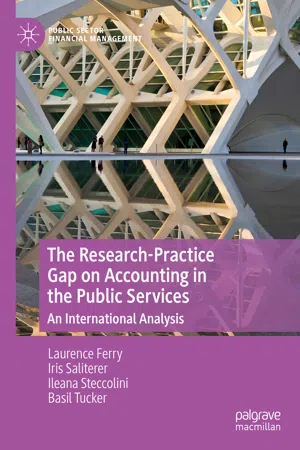A significant challenge for academia is to be, and be seen to be, relevant to practice, and for practice to have, and be seen to have, the legitimation of being theoretically robust. As Paarlberg (1968) highlighted, ‘Practice is brick; theory is mortar. Both are essential and both must be good if we are to erect a worthy structure’. However, all too often, the worlds exist separately, undermining the potential contributions that can be made from a closer relationship between theory and practice. The situation has become particularly evident in accounting research, where academic s and their research are often seen as cut off from what is happening in the so-called real world outside of the ivory towers of universities , and the practical as well as societal relevance of research has been questioned (Laughlin 2011; Parker et al. 2011; Tucker and Parker 2014; Chapman and Kern 2012).
Concerns about a (widening) research-practice gap have been raised in much of the recent accounting literature (Evans et al. 2011; Modell 2014; Tucker and Lowe 2014; Tucker and Parker 2014; Tucker and Schaltegger 2016). It has been argued that current international trends in journals’ rating and benchmarking are amplifying this situation, additionally risking the relevance and quality of accounting research (Parker and Guthrie 2010), and contribute to an increasing narrowness and fragmentation in terms of methods and perspectives (Guthrie and Parker 2016; Humphrey and Miller 2012).
Aside from a sustained interest in public services accounting research, recent reviews of the literature have also raised similar concerns for this field (Broadbent and Guthrie 2008; Goddard 2010; Jacobs 2016; Jacobs and Cuganesan 2014). Indeed, the engagement of academic research with practitioner s, although central to the production of knowledge in public administration, has nevertheless been described as challenging (Buick et al. 2015), having been recognized as a ‘perennial problem’ (Reed 2009, p. 685). Pointing to the challenges and ‘wicked’ problems both practitioner s and academic s have to face, an increasing number of scholars call to action for (interdisciplinary) accounting researchers ‘to reflect on what these turbulent times means for society and to ensure that their academic endeavours make a contribution to practice, polic y and a wider societal good’ (Guthrie and Parker 2016) and to ask if and how accounting accounts for, but also impacts on, issues of wider social relevance (Steccolini 2016). Guthrie and Parker (2014), reflecting on what constitutes a global accounting academic , highlight how engaging with the profession and society can give impact to academic ’s teaching and research both in their own countries and internationally.
It is within this motivation of interdisciplinary accounting research in the public services that embraces the public interest and engagement through bringing together academic s and practitioner s that this book is situated, as a comparative analysis to highlight the potential of constructing an enabling accounting for the wider societal good. This book therefore addresses potentials for and barriers to bridging a research-practice gap in (public service) accounting research that is a long debated issue with uncertain and no definitive solutions (ter Bogt and Van Helden 2012). In so doing, the book does not have the ambition to definitively bridge the practice-academia gap, but represents a further effort to try to narrow it by presenting and contrasting the views from 21 different countries and representatives of 3 international professional accounting bodies.
While the different contributions provide evidence of engagement between academic s and practitioner s, they also reveal that the engagement remains at the margins and that more can be done in accounting research in general and in a public service context in particular.
The origins for this book that considers a comparative analysis of research and practice on accounting in the public services is found in the International Research Society of Public Management (IRSPM) Special Interest Group on Accounting and Accountability. This was established in 2011 with the aim of contributing to and influencing the ‘international’ debate on accounting, accountability, and performance measurement systems in the public sector. Part of this role involved developing a distinctive, interdisciplinary research approach which embraced theoretical, methodological, and geographical diversity as well as engagement with public policy and practice communities.
Over the past seven years, the group has organized an annual workshop with the objectives to build a network of researchers in the area of accounting and accountability in the public services and to lay the foundations for developing future research strategies and projects that are useful for practitioner s and researchers. In the third workshop at the Nottingham Business School, Nottingham Trent Universit y, in 2015, the overarching theme ‘Engaging Academia with Practice and Policy: A Step Forward’ was addressed w...
